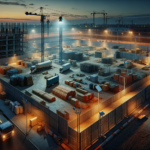Construction sites have become a prime target for theft, vandalism, and trespassing. In the US alone, equipment theft from construction sites amounts to over $1 billion annually according to recent industry surveys. Copper wiring and piping theft is also rampant, costing tens of millions each year. Vandalism incidents that damage property or inventory can quickly derail projects, adding unexpected delays and expenses.
With the rise of affordable high-resolution security cameras and smart video analytics, construction firms now have effective tools to deter theft, detect trespassers, monitor operations, and reduce liability from incidents. While cameras have been growing in popularity across sectors, the construction industry in particular stands to benefit enormously from comprehensive video security and surveillance.
Construction site security cameras are an invaluable investment that pays dividends through better protection of assets and inventory, improved monitoring and management of projects, enhanced safety and risk identification, and reduced exposure to liability claims.
Importance of Construction Site Security
Construction sites contain valuable building materials, tools, and equipment that make attractive targets for thieves, resulting in costly losses. Just some of the high-value items frequently targeted include:
- Copper piping, wiring, and heavy machinery that can be illegally resold
- Tools, generators, debris chutes that can fetch money at pawn shops
- Building materials like lumber, metal studs, doors that criminals can repurpose
Vandals that damage property, inventory, or ongoing work also create very disruptive setbacks and unexpected costs. Graffiti, arson, or dumped debris forces crews to halt progress to repair and clean up damage.
Unauthorized trespassers on active construction sites also pose a major risk for injuries, accidents, and even fatalities if improper safety precautions are taken. This creates tremendous liability exposure for construction firms.
Video security cameras are vital for:
- Proactively preventing theft before it occurs instead of handling costly aftermath
- Deterring potential vandals from targeting sites due to increased chance of being caught
- Monitoring for trespassers and restricting access to dangerous areas
- Identifying safety hazards like unsafe worker behaviors or code violations
- Providing video evidence to reduce liability for firms if incidents occur
The ability to monitor sites remotely and receive alert notifications enables quicker response times to incidents. Recording and documenting all site activity also aids post-investigations and insurance claims.
Choosing Construction Security Cameras
The harsh conditions of construction sites demand specialized security cameras designed to withstand elements like dust, moisture, and vibration from heavy equipment. Key features to consider include:
Key Features in Choosing Construction Security Cameras
Durability – Impact-resistant housings protect against dust, rain, and shocks. NEMA ratings indicate durability levels. Cameras should withstand job site hazards and temperature extremes.
Remote Access – Cameras with cloud connectivity or onsite network video recorders (NVRs) allow access to feeds from any web browser or mobile app. Critical for real-time monitoring.
Power Source – Hardwired, battery powered, solar powered, and PoE (Power over Ethernet) cameras suit different placement needs. Hardwired is most secure and reliable.
Video Quality – High resolution, low light sensitivity, wide dynamic range (WDR), and low latency are vital, especially for PTZ cameras. 4K and infrared or thermal cameras reveal critical details.
PTZ vs Fixed – Pan/tilt/zoom (PTZ) cameras provide adjustable views while fixed capture wider angles. Using both provides comprehensive coverage. PTZs also have advanced capabilities like tracking.
Storage/Bandwidth – Onboard SD card storage offers failsafe local recording if connectivity is disrupted. Cloud archives enable expansive long-term storage. Bandwidth determines streaming quality.
Strategic Camera Placement
Carefully planning security camera positioning is crucial for effectively monitoring key areas while avoiding coverage gaps that criminals can exploit. Recommended best practices include:
Perimeter Access Points – Use rugged fixed view cameras at ingress/egress points to restrict and document access. Capture license plates of vehicles.
Entry/Exit Gates – Record all traffic through gates and correlate with perimeter cameras for air-tight monitoring.
Material Storage Areas – Position cameras for wide coverage over all inventory like piping, tools, equipment, and lumber.
Active Work Zones – Panoramic multi-lens cameras provide sweeping views of broad work areas. Supplement with PTZ cameras to zoom in on fine details.
Site Trailers – Secure offices and equipment inside trailers with interior and exterior cameras.
Blind Spots – Ensure complete area coverage, installing additional cameras to eliminate blind spots where crimes could go undetected. Use infrared cameras to illuminate dark areas.
Careful planning and camera placement is crucial for security and safety across construction sites. Gaps in coverage or monitoring can undermine the full value of even enterprise-class camera systems.
Construction Site-Specific Camera Types and Features
Construction sites present unique challenges that demand specialized cameras designed specifically for the harsh industrial environments and stringent monitoring needs.
Panoramic Multi-Lens Cameras – Capturing sweeping 180o, 270o or full 360o views, these cameras feature multiple integrated lenses within one durable housing. Some feature up to 8 synchronized lenses enabling one camera to provide complete, distortion-free coverage over large spaces like warehouses or active work zones.
License Plate Recognition (LPR) Cameras – Designed specifically for extremely accurate and fast license plate capture, LPR cameras play a vital role at gates and site entrances. LPR capabilities can whitelist approved vehicles or trigger alerts for unauthorized vehicles.
Wireless Cameras & Broad Reception – With ruggedized housing that protects components from vibration, debris and weather, wireless security cameras provide versatile placement options for temporary sites, remote areas lacking wired power, and movable trailers. Military-grade transmission resilience ensures reliable connectivity across long distances and through physical barriers.
Infrared & Low Light Cameras – When work continues overnight or in dark conditions, infrared illuminators allow cameras to see clearly up to 250 meters away, rendering video in crisp black and white. Great for capturing forensic details like clothing, faces and tools.
High Resolution PTZ Cameras – Pan/Tilt/Zoom cameras serve as eyes that can scan across wide angles and tactically zoom in on areas of interest. 4K resolution paired with powerful optical zoom reveals critical details for live monitoring and forensic investigation. Some feature automatic object tracking functions.
Explosion-Proof Cameras – Rugged enclosures made of corrosion-resistant stainless steel or copper-free aluminum provide critical spark and vapor sealing to prevent igniting flammable chemicals and gases in volatile petrochemical facility or refinery construction sites. Explosion-proof rating ensures survival and functionality after explosions.
Covert “Hidden” Cameras – Discreet mini cameras hide unsuspectingly inside everyday items like clock radios, hardhats, clothing, equipment. Help catch criminals in the act when overt cameras could deter crimes like theft. Provide viewpoints unlike traditional placements.
The latest specialized camera models open up new monitoring possibilities to overcome site-specific challenges. The most effective construction camera systems combine tailored fixed and PTZ cameras to capture both expansive views and fine details across sites.
Video Monitoring and Management
Modern IP-based security camera networks offer robust tools for proactive live monitoring and swift investigative capabilities:
Remote Access – Browser-based and mobile apps allow authorized users to access live and recorded video footage from all fixed and PTZ cameras distributed across one or multiple locations. Critical for real-time visibility when away from sites.
Alert Notifications – Smart motion detection, tripwire and perimeter breach alerts instantly notify staff of suspicious activity or idle assets via SMS, email or in-app. Accelerate response times.
Video Analytics – Powerful AI analytics include people counting for occupancy violations, loitering and dwell time detection, foreign object detection in key zones, and camera tampering alerts.
Local Video Storage – Commercial-grade network video recorders (NVRs) onsite securely record 4K camera footage with redundancy. Local storage acts as failsafe if internet connectivity is disrupted.
Cloud Archives – Encrypted cloud storage enables expansive, low-cost video archiving along with worldwide access to footage through robust cybersecurity protocols like 2-factor authentication.
Additional Security Measures
While surveillance cameras provide a vital layer of monitoring, detection and investigative capabilities, integrating video solutions with other physical security controls closes vulnerabilities in a defense-in-depth approach:
Physical Barriers – Fencing, bollards, secured entryways prevent unauthorized access while cameras provide further access point monitoring.
Guards & Patrols – Live surveillance and alerts direct guard dispatch for swift responses. Video verification of alarms reduces false positives.
Awareness Signage – Prominently placed warnings make intruders aware of surveillance, acting as deterrent while providing consent if recordings used as evidence.
The best construction site video surveillance reinforces and bolsters physical security measures while adding expanded monitoring coverage. Cameras also provide accountability for guards and staff behaviors across sites.
Getting Started with a Tailored Plan for Construction Site Security Cameras
Installing security camera systems tailored to rugged construction site environments provides multifaceted benefits that make them a vital investment rather than a discretionary expense.
Key benefits that cameras offer construction firms include:
Total Site Visibility – Robust camera coverage eliminates blind spots across perimeter, entry gates, work zones, equipment yards and trailers. Live remote access and alerts enable proactive response capabilities.
Deter Theft & Vandalism – Prominently posted signage makes criminals aware of surveillance and smart detection, dissuading crimes of opportunity that derail projects.
Protect Assets – Building materials, tools and machinery costing thousands of dollars are protected from growing theft problem that has cost the industry billions.
Limit Access – Advanced analytics detect trespassers and triggers alerts to dispatch authorized personnel, keeping unauthorized individuals out of hazardous areas
Enhance Safety – Live views help supervisors proactively identify risky behaviors like improper equipment operation so they can radio operators to prevent accidents and injury.
Expedite Investigations – Evidentiary-grade footage speeds insurance claims processing and police investigations to recover stolen assets and prosecute vandals.
Reduce Liability – Documented footage provides proof of events to defend against false claims. Demonstrates security best practices were upheld.
Optimize Operations – Better understand site activity patterns to guide scheduling, staffing optimization and yard planning.
Developing a strategic construction camera plan requires assessing vulnerability risks across locations, surveying site geography, integrating with existing access control and alarms, planning placement to eliminate blind spots, choosing cameras suited for conditions, ensuring resilient connectivity and power reliability, and implementing cybersecure remote access controls and video data management policies.
Get in Touch with Live Patrol for Construction Site Security Cameras and Professional Implementation and Monitoring
Live Patrol Security takes a comprehensive approach to construction security, offering end-to-end services from risk evaluation through system design, professional installation and responsive monitoring.
With years of securing construction sites, we provide specialized solutions incorporating leading hardware, innovative software and top-quality services proven to prevent asset loss and liability across industrial builds. We also operate our own live monitoring station staffed 24/7 by highly trained personnel.
Construction firms can schedule a no-obligation site evaluation and system design consultation with one of Live Patrol’s certified security experts. We provide transparent pricing with no hidden fees. Rental financing options also available.
Contact Live Patrol for your free site evaluation and quote. Discover what a comprehensive video security partner dedicated to the construction industry can offer your company.


